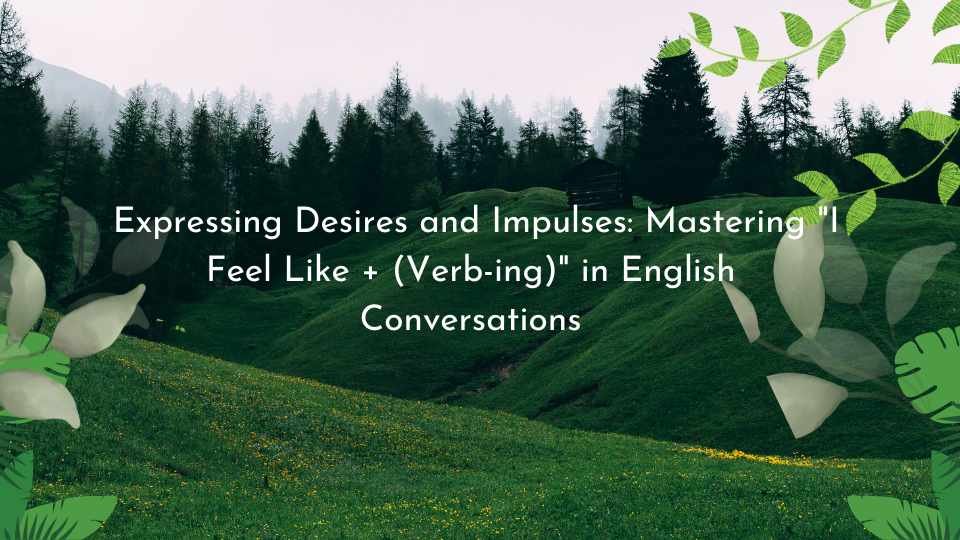Are you eager to express your desires, impulses, and inclinations with precision and spontaneity in English conversations? Understanding and employing the “I feel like + (verb-ing)” format can help you articulate your thoughts and feelings effectively. In this blog, we’ll explore this versatile structure with numerous real-life examples to help you master its usage effectively.
-
Introduction to “I Feel Like + (Verb-ing)”:
“I feel like + (verb-ing)” is a dynamic structure in English used to express desires, inclinations, or impulses regarding actions or activities. Mastering this format allows you to communicate your spontaneous thoughts and feelings with authenticity and clarity. -
Expressing Spontaneous Desires:
One of the primary uses of “I feel like + (verb-ing)” is to express spontaneous desires or cravings. Let’s explore some examples:- “I feel like eating pizza tonight; it’s been a long week.”
- “I feel like going for a walk in the park; the weather is perfect.”
- “I feel like watching a movie; it’s raining outside, and it’s cozy indoors.”
-
Expressing Immediate Impulses:
Beyond desires, “I feel like + (verb-ing)” can also be used to express immediate impulses or inclinations. Consider these examples:- “I feel like calling my friend; I haven’t spoken to them in a while.”
- “I feel like taking a nap; I’m feeling tired after a busy day.”
- “I feel like going for a swim; the pool looks inviting on a hot day.”
-
Expressing Emotional States:
“I feel like + (verb-ing)” can also be employed to express emotional states or moods. Explore these examples:- “I feel like laughing; that joke was hilarious.”
- “I feel like crying; the movie was so touching.”
- “I feel like singing; I’m in a joyful mood today.”
-
Expressing Long-Term Goals or Ambitions:
In addition to immediate desires, “I feel like + (verb-ing)” can be used to express long-term goals or ambitions. Take a look at these examples:- “I feel like traveling the world; there’s so much to explore and experience.”
- “I feel like pursuing my passion for photography; it brings me joy and fulfillment.”
- “I feel like learning a new language; it’s a valuable skill that opens doors to new opportunities.”
-
Joining Guruji English Classes:
If you’re committed to advancing your English language skills and achieving fluency, consider enrolling in Guruji English Classes. Our comprehensive courses are designed to cater to learners of all levels, providing expert instruction and valuable resources to support your journey. Don’t hesitate to contact us at 9759999231 to explore our FREE English Speaking course and take the next step towards proficiency.
By incorporating the “I feel like + (verb-ing)” format into your daily conversations, you’ll not only enhance your English fluency but also express your desires, impulses, and aspirations with authenticity and spontaneity. Join Guruji English Classes and unlock your potential to communicate effectively in any situation.
So, what are you waiting for? Start using “I feel like + (verb-ing)” in your everyday speech and express your thoughts and feelings with clarity and spontaneity. Remember, embracing your desires and impulses enriches your life and adds excitement to your experiences.
